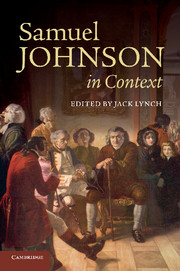Book contents
- Frontmatter
- Contents
- Illustrations
- Contributors
- Preface
- Chronology
- Abbreviations
- Part I Life and works
- Part II Critical fortunes
- Part III Contexts
- Chapter 10 America
- Chapter 11 Anglicanism
- Chapter 12 Anthropology
- Chapter 13 Authorship
- Chapter 14 Biography
- Chapter 15 Book trade
- Chapter 16 Clubs
- Chapter 17 Conversation
- Chapter 18 Dictionaries
- Chapter 19 Domestic life
- Chapter 20 Education
- Chapter 21 Empire
- Chapter 22 Essays
- Chapter 23 Fiction
- Chapter 24 History
- Chapter 25 Journalism
- Chapter 26 Law
- Chapter 27 Literary criticism
- Chapter 28 London
- Chapter 29 Medicine
- Chapter 30 Mental health
- Chapter 31 Money
- Chapter 32 Nationalism
- Chapter 33 Philosophy
- Chapter 34 Poetry
- Chapter 35 Politics
- Chapter 36 Scholarship
- Chapter 37 Science and technology
- Chapter 38 Scotland
- Chapter 39 Sermons
- Chapter 40 Shakespeare
- Chapter 41 Slavery and abolition
- Chapter 42 Social hierarchy
- Chapter 43 Theatre
- Chapter 44 Travel
- Chapter 45 Visual arts
- Chapter 46 War
- Chapter 47 Women writers
- Further reading
- Index
- References
Chapter 24 - History
from Part III - Contexts
Published online by Cambridge University Press: 05 June 2012
- Frontmatter
- Contents
- Illustrations
- Contributors
- Preface
- Chronology
- Abbreviations
- Part I Life and works
- Part II Critical fortunes
- Part III Contexts
- Chapter 10 America
- Chapter 11 Anglicanism
- Chapter 12 Anthropology
- Chapter 13 Authorship
- Chapter 14 Biography
- Chapter 15 Book trade
- Chapter 16 Clubs
- Chapter 17 Conversation
- Chapter 18 Dictionaries
- Chapter 19 Domestic life
- Chapter 20 Education
- Chapter 21 Empire
- Chapter 22 Essays
- Chapter 23 Fiction
- Chapter 24 History
- Chapter 25 Journalism
- Chapter 26 Law
- Chapter 27 Literary criticism
- Chapter 28 London
- Chapter 29 Medicine
- Chapter 30 Mental health
- Chapter 31 Money
- Chapter 32 Nationalism
- Chapter 33 Philosophy
- Chapter 34 Poetry
- Chapter 35 Politics
- Chapter 36 Scholarship
- Chapter 37 Science and technology
- Chapter 38 Scotland
- Chapter 39 Sermons
- Chapter 40 Shakespeare
- Chapter 41 Slavery and abolition
- Chapter 42 Social hierarchy
- Chapter 43 Theatre
- Chapter 44 Travel
- Chapter 45 Visual arts
- Chapter 46 War
- Chapter 47 Women writers
- Further reading
- Index
- References
Summary
HI′STORY. n.s. [ἱστορία; historia, Latin; histoire, French.]
1. A narration of events and facts delivered with dignity.
Justly Cæsar scorns the poet’s lays;
It is to history he trusts for praise. Pope.
History was one of the most popular genres of literature in the eighteenth century. Publishing statistics make the case: the English Short Title Catalogue lists over 22,000 items with that subject. Limiting the search to works with the word “history” in the title, history as the subject, and published within Johnson’s lifetime, still yields more than 3,000 items. To give another and somewhat more careful measure of the importance of history books in England at this time, historian Richard B. Sher finds that, of the 360 books of the Scottish Enlightenment first published in Britain, sixty-eight were on the subject of history, more than on any other subject. The range of these works is enormous: from schoolbooks to learned, antiquarian tomes; from histories of small towns and groups of people to histories of the world. The genre is also elastic, stretching easily into the particulars of biography on the one hand and into the generalities of universal history on the other.
In addition, of course, history writing from earlier periods was still available to eighteenth-century readers. Greek and Roman historians such as Suetonius, Tacitus, Livy, Herodotus, and Thucydides continued to be published often, and the earlier British historians were also conspicuous on the shelves of eighteenth-century readers: Sir Walter Ralegh’s History of the World (1614), Francis Bacon’s History of the Raigne of King Henry VII (1622), Gilbert Burnet’s History of the Reformationin England (1679–81), and the Earl of Clarendon’s posthumously published History of the Rebellion and Civil Wars (1702), for example, were still widely read at mid-century. Some of these works prefigure innovations in historical writing usually ascribed to the eighteenth century. Nevertheless, some trends in the evolution of historical writing are properly assigned to Johnson’s lifetime, and these may be described in terms of subjects, methods, scope, and style.
- Type
- Chapter
- Information
- Samuel Johnson in Context , pp. 208 - 215Publisher: Cambridge University PressPrint publication year: 2011



